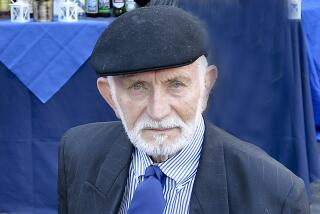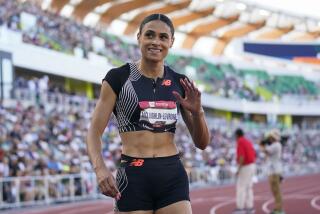Something Missing From Konchellah’s Run for Glory
- Share via
REDONDO BEACH — Billy Konchellah was in his element. The hot humid air in Tokyo hung on the spectators and athletes during the men’s 800-meter run on Aug. 27 at the World Championships of Track and Field.
Konchellah, dressed in the green-and-red uniform of Kenya, was not the favorite. The spectators looked toward Brazil’s Jose Luiz Barbosa, the United States’ Mark Everett and Konchellah’s countryman, Paul Ereng. Konchellah was considered a long shot.
But with 100 meters left, Konchellah and Ereng made a move. With 40 to go, Konchellah drove past Ereng and Barbosa to win his second World Championship. Arms stretched skyward, Konchellah began a victory lap, carrying the Kenyan flag. It was obvious Konchellah was happy, enjoying the adoration.
But life has not always treated Konchellah so well.
Three months after winning the race, Konchellah, a graduate of Mission Viejo High School who now lives in Albuquerque, N.M., was in Redondo Beach, explaining the path his track career has followed.
“Although now I’m popular in some way, in some parts of the world, I think the most important thing is if you’re happy,” said Konchellah, 29. “But I feel that my life’s accomplishment has not been finished, and that’s my education. I always feel like something’s missing.”
In 1979, Konchellah, the oldest son in a family of nine, came to the United States from Kilgoris, Kenya--a town 250 miles west of Nairobi--to compete and with an ambition to finish his schooling in the states.
Konchellah--already a top 400-meter runner at 16--had received many offers from college coaches to put him up for his senior year of high school. He decided, at the behest of Iowa State Coach Bill Bergan, to come to Cedar Rapids.
Konchellah enrolled at Cedar Rapids Kennedy High School and attended the school for a short while before he began receiving phone calls from Gordon Cooper, a former trainer of Olympic hurdler Edwin Moses who offered Konchellah an opportunity to live and train in Mission Viejo.
In October, Konchellah agreed to accept Cooper’s offer. Cooper became Konchellah’s guardian and coach, arranging for him to live with a local family.
“It was fall, and it was starting to get cold, which I was not used to,” Konchellah says. “If Gordon Cooper hadn’t contacted me, I probably could have persevered and kept on going. And later on, gone to Iowa State.”
Konchellah says he regrets the decision to move.
“I wish he (Cooper) had never contacted me because I would have been a more happy person,” he says. “And my goals in track and field would be much further than what they are now. I could have finished school, which I have ended up not finishing. Meeting him was a big mistake in my life.”
Konchellah says he wanted to run for Mission Viejo High School but that Cooper wouldn’t let him.
“I wanted to run for Mission Viejo, but we got in an argument,” Konchellah said. “At that time, he bought me a car, and he bought me a moped. All these things for a high school kid--it’s like you don’t want to lose this stuff. I felt like I wanted to go back to Iowa, but I remembered the cold and everything, so I ended up not running for the school. I could have had the national high school record for 800 meters now if I had run for the school.”
Gene Gurule, the track and field coach at Mission Viejo in 1980, says he tried to get Konchellah on the team.
“Yes, we did try,” Gurule said. “At that particular time, he was running for Gordon Cooper, and I guess Gordon had his own plans about what he wanted to do for him.
“I remember one time, as I came across campus, I saw Billy sitting under a tree at lunch, sitting all by himself. He was shy, and I think the idea of him competing on a track and field team would have helped him tremendously socially, because he was really kind of a loner as a kid.”
Cooper, who stopped coaching in 1989, denies he had discussions with the Mission Viejo coaches about Konchellah running for the school team.
“I don’t remember Mission Viejo High School showing any interest,” Cooper says.
Cooper says he didn’t actively seek to put Konchellah on the Mission Viejo team for a couple of reasons. He says he didn’t want to “open” questions about Konchellah’s eligibility, and because Konchellah could run under 46 seconds in the 400 meters, he didn’t feel there would be any competition at the high school level.
On April 19, 1980, in the men’s invitational 800-meter run at the Mt. San Antonio College Relays, Konchellah placed second in 1 minute 46.79 seconds.
It was Konchellah’s debut at the distance; the high school national record at that time--1:48.2--was held by Jeff West of Los Angeles Crenshaw. The 880 record was held by El Cerrito’s Dale Scott at 1:48.5, which is equivalent to 1:47.9.
After high school, Konchellah went to San Diego State to run and earn a degree, but he was at the school for less than a year before he was dismissed; Konchellah says it was because he went to Kenya during the school year without notifying San Diego State.
“I came here (to the United States) with a mission to go to school,” Konchellah says. “I had always been a good student when I was in Kenya and when I was here until I went to San Diego State.
“But I didn’t have anybody really who I could ask for good advice . . . I had to make my own judgments, and being so naive and not knowing what’s going on, I just made the wrong decisions and continuously built myself into a hole until I could not get out of it.”
In 1983, Konchellah received an athletic scholarship to Wayland Baptist in Plainview, Tex. He won indoor and outdoor NAIA championships in the 800, and the Kenyan government invited him to the country’s Olympic Trials. He won despite a hip flexor injury and placed fourth in the Los Angeles Olympics.
In the fall of 1984, Konchellah began having health problems and left Texas.
“I started to develop some breathing problems and started getting some heavy colds,” he says. “I was coughing and wheezing. I couldn’t sleep at night. It was difficult, and then I thought it was because of the cold weather, so I decided to leave Texas.”
Konchellah moved to the Redondo Beach area, and the problems continued. Finally, a doctor diagnosed Konchellah as having severe asthma.
“This doctor found out it was just asthma (along with strong allergies),” Konchellah says. “He started treating me for that, and I started feeling better.”
The doctors also referred Konchellah to Ron Allice, the coach at Long Beach City College. Konchellah trained with Allice for 1 1/2 years. In 1987, Konchellah won the 800 in the World Championships in Rome.
“He is probably the most talented athlete I’ve ever had the opportunity to work with. He’s very gifted,” Allice says. “Had he not had his asthma problem, there’s no telling what he could have done, including breaking the world record. But we had to work around his condition.”
In 1988, Konchellah, suffering from an Achilles injury and asthma, watched the Seoul Olympics on television in Redondo Beach. He wasn’t heard much from during the next two years.
“It was just two years of running very sorry races,” says Konchellah, who estimates he dropped out of 40% of them. “I never broke 1:46. I was training hard but I’d get into a race, my asthma would be there, and I couldn’t breathe--couldn’t even think about the race.”
Konchellah moved to Albuquerque in October, 1990, and found some relief from his symptoms in the clean air. He placed second in the Kenyan championships in June and says that at that time, he felt ready to defend his title in Tokyo. In a meet in Zurich before the championships, Konchellah finished last in 1:47.2 after missing more than a week of training because of a cold and a hamstring injury.
“By the time I reached Tokyo, I was at my peak. I was ready, and I knew it,” Konchellah says. “Everyone counted me out because of the Zurich meet I ran. So no one took me seriously. That’s what happened to Barbosa--he didn’t take me seriously.
Because of his ailments, Konchellah has had an on-again, off-again career. His current plans are to break the 800 world indoor record, but he can’t predict if he’ll be healthy when the time comes.
“See, if I didn’t have my asthma, I’d have a lot of strategy,” he says. “Then I’d really plan out to eat so much, train like this. If I set those goals, and I don’t meet them, I get frustrated so I don’t set them. I just train at the moment.”
He also says he still regrets his past and hopes eventually to finish his education.
“Although I’ve won two world championships, I feel like I’m a nobody,” he said.
To Konchellah, something is still missing.
More to Read
Go beyond the scoreboard
Get the latest on L.A.'s teams in the daily Sports Report newsletter.
You may occasionally receive promotional content from the Los Angeles Times.










